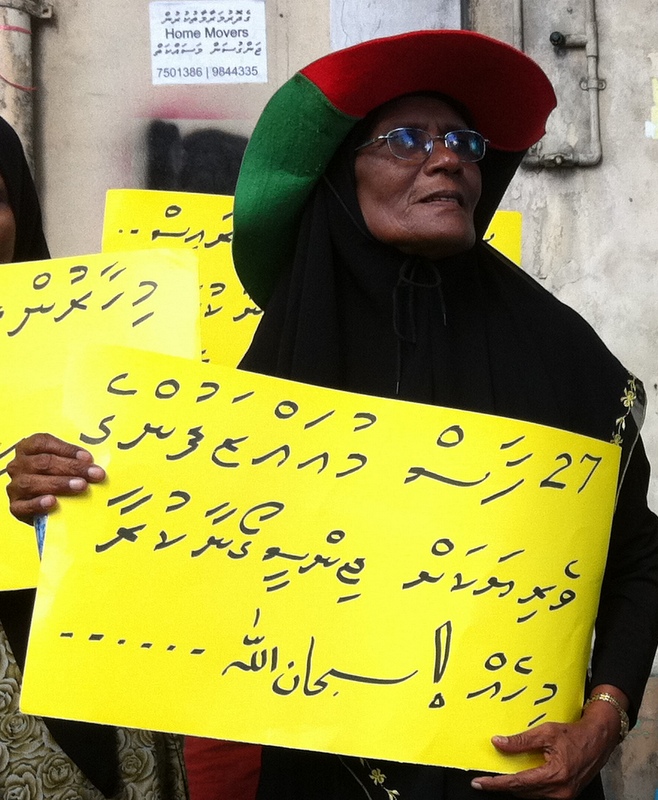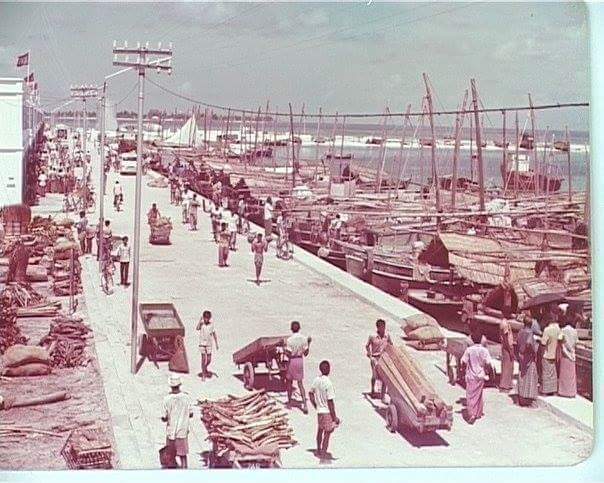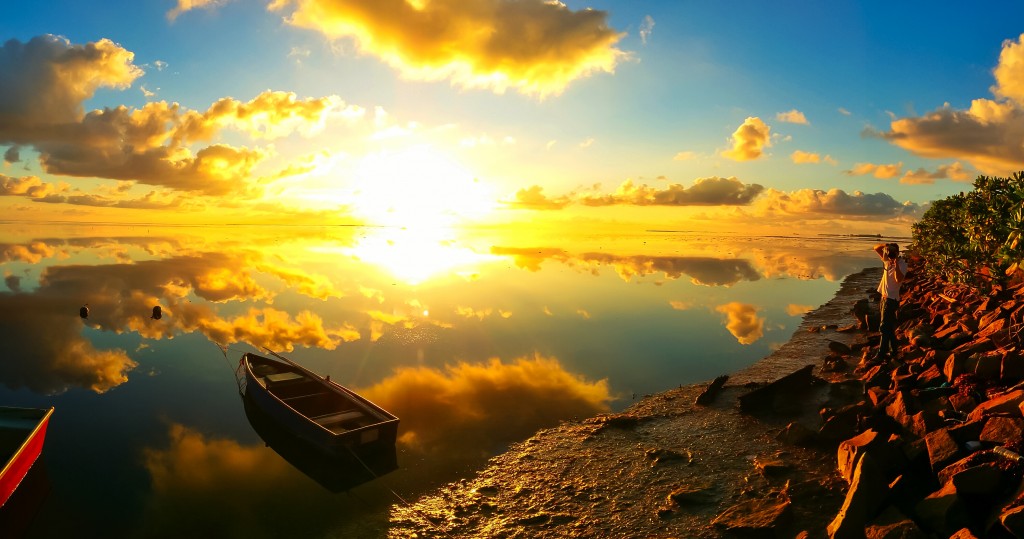The status of women in Maldivian society
by H Abdulghafoor
He took a mouthful of water and sprayed her face with his spit – at close range.
That is the action of the male Parliamentary Group (PG) Leader of the governing Progressive Party of Maldives (PPM) against the female Deputy Leader of the opposition Maldivian Democratic Party (MDP), in the People’s Majlis of the Maldives on 24 February 2016.
The incident took place during a formal meeting of the Majlis that was broadcast live to the public.
This image exemplifies the condition of men and their attitude towards women in the current social context of the Maldives.
She reacted instinctively by taking a nearby glass of water and throwing it in his face. In that split second, the expression on his face showed his realisation that he had been brought down to the ground by a woman, in front of his male colleagues in the male dominated Majlis, where only 5 of the 85 members are women. That momentary come-down can be interpreted as a small victory for any woman degraded and attacked by a man in such a way.
Personal beliefs play a critical role in what people choose to do, or not do. Such beliefs shape their behaviour towards others. As a commentator in a news article about the incident responded – “How would Nihan react to a woman who argued with him if there were no cameras around? …. I feel sorry for his wife”. This is a valid point because the behaviour of men towards women in the public arena is very likely a reflection of attitudes and actions that may be practised in their private lives.
A strong perception of the inherently unequal status of men and women in Maldivian society is well established through the age-old system of patriarchy. It is also solidified through a questionable, perceived religious position that requires the elevation of men to a higher place from where they may rule over the lives of women. Religious sermons have provided a variety of explanations to uphold such a position. It will not do justice to the multiplicity of messages the Friday Sermon provides if one or two points are randomly taken. Nevertheless, it is useful for the purpose of this discussion, to try and provide a relevant and notable example. On 22 January 2016, the Friday Sermon said :
Muslim brothers! The husband is the person who has the highest level of responsibility to look after the family. He has the highest responsibility on all matters of the family. The husband has the highest responsibility to look after his wife. On matters relating to children too, the highest responsibility falls on the husband. [unofficial translation]
Notable also is the generally overlooked fact that the Friday sermon consistently addresses a male audience of “brothers”. In the Maldives where the State religion is Islam, the contents of the Friday sermon is produced and disseminated nationally by the government.
The extent to which men uphold the above State endorsed, perceived religious ideal is questionable. The lived reality of Maldives is that the country has the highest rate of female headed households in the world at 47% and has held the dubious record of the highest divorce rate in the world. The common practice of triple talaq (or verbal triple divorce) by the husband was only outlawed by the introduction of the Family Act in 2000, alongside the incomplete arrangement to partially establish the age of marriage at 18 years. Granted, these are developments towards a greater degree of social responsibility and accountability within the family. However, the degree to which they help to achieve stability and peace in the family and beyond, is open to debate in the prevailing context.
Two days prior to the spitting incident, on 22 February 2016, the Peoples’ Majlis held its first discussion on the newly submitted, first ever draft legislation on gender equality in the Maldives. The gender equality law (GEL) was submitted to the Majlis by Asma Rasheed, the only female MP in the Majlis representing the majority party PPM. As the PG group leader, MP Nihan endorsed the GEL with supportive fervour on the Majlis floor. That endorsement and his retrograde public behaviour towards his female colleague just two days later, was a moment which showed the public that a mask of deep hypocrisy had slipped and exposed what lay behind.
On 11 March 2015, allegations emerged from MDP MP Rozaina Adam that PPM MP Riyaz Rasheed had threatened to rape her and this threat was reported by MDP as being directed at both MP Rozaina and MP Mariya Didi, inside the parliament’s chambers. According to MP Rozaina, formal complaints were submitted to the Speaker of the People’s Majlis about these threats in March 2015, and also the recent attack against her by MP Nihan in February 2016. To date, she informs that she has received no responses to either of these serious complaints. There are no reports of any investigation or disciplinary measures being taken against these parliamentarians for such harassment of female colleagues in the workplace, in a public institution like the parliament.
During the parliamentary discussion of the GEL on 22 February, MP Mariya Didi provided some telling insights into the general attitude of male MPs towards female colleagues. She said –
We see how female members are treated in this Majlis. Many a day, we see inside this Majlis, the only female MP in PPM’s parliamentary group coming to us after their PG meeting, with tears pouring from her eyes because of the way she is spoken to, and because she is not allowed the opportunity by her party to say what she wants. These are things that are happening before our eyes. [unofficial translation]
Harassment of women in the workplace is a particularly neglected area of continuing gender-based oppression in the Maldives. It is a clear sign of human under-development, and a serious absence of a civilising force within the education, human resource development and employment sectors.
The absence of accountability is one of the fundamental gaps that maintain this damaging status quo. An important high profile case in point is that of workplace harassment allegations made against the former President of the Civil Service Commission (CSC), Mr Mohamed Fahmy Hassan. The following summary of events from May 2012 to November 2015 tells a story of patriarchal impunity.
- In May 2012, a junior female employee of the CSC alleged “that she had been subject to sexual harassment by Fahmy”
- In June, the allegations were reported to be investigated by the police service
- In July, media reported Fahmy’s refusal to resign his post, despite an order by the Parliament, following scrutiny of the case by a parliamentary committee
- In November, parliament removed Fahmy from his post following a vote of 38 MPs for the motion and 32 against
- In March 2013, the Supreme Court ruled Fahmy’s removal to be unconstitutional
- In July 2015, Fahmy was appointed the new Maldivian ambassador to Malaysia
- In November 2015, the Civil Court ordered Fahmy be compensated by the State “with salaries and benefits … for the two years and six months he was left unemployed”, amounting to MVR421,733.
In the above case, a female junior employee made the unusually bold move to report a case of sexual harassment against her by a senior male employee of the State, in a position of great responsibility and authority. The performance of the State machinery to deliver justice can be seen in the unfolding events related to the case. One woman’s plight to seek redress for an injustice suffered had arguably resulted in another injustice to the public purse and the public psyche. Where can a woman go in the Maldives, to seek redress to an injustice done against her? The answer is clear. Nowhere.

Women’s protest calling to remove Fahmy from office – 2012. Placard says: “A sexual harasser in charge of 27,000 employees – oh my God!”
Today is International Women’s Day.
Women’s rights advocates around the globe are working in solidarity to push humanity towards the one common goal for equality of the sexes. They continue the long and slow uphill struggle to fight patriarchy, the insidious yet visible elephant in the room of human progress, which fights back to deny women their rightful place as equals alongside men.
In the Maldives, advocates work to find and establish spaces for women in the above described situation where the odds are stacked firmly against women. They work in a situation where a man considers it permissible to spit in the face of his female colleague in his workplace which happens to be the country’s parliament. They work in a situation where a male MP can threaten to rape his female colleague, without scrutiny or consequence. They work in a situation where the efforts of the brave woman who makes a stand against sexual harassment in her workplace are washed away by the power of patriarchal “brotherhood”.
Yet, what is assured on this International Women’s Day is that their work will not be stalled or interrupted. The GEL will be fought for and won through the efforts of the rights-minded women and men who work towards this cause, with the same determination that achieved the country’s first Domestic Violence Prevention Act back in 2012. The spirit and commitment which brought the random act of male triple talaq to an end, through the Family Act 2000 is evidently alive and well. These efforts will be supported by the rights-minded citizens who seek the establishment of a more just society. A society in which such legislation will one day bring relief and redress against the excesses, injustices and impunity of the patriarchal “brotherhood”.
Gender equality is a fundamental issue of justice.
It is an issue of social stability, meaningful human coexistence, unity and peace.
To perpetuate inequality and injustice on the basis of one’s sex, which is in fact an accident of birth, is an affront and indignity to human intellect in the 21st century.
Gender equality is the rights way ahead.
It may be the road less travelled, but the one that must be taken.

